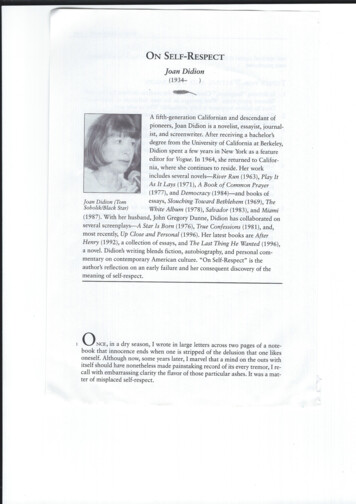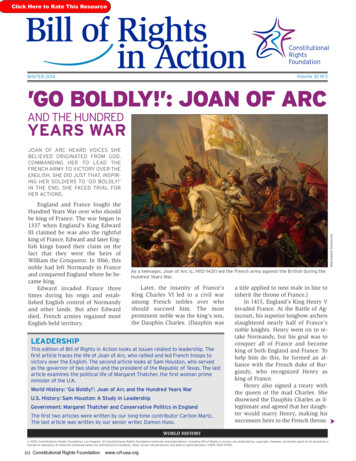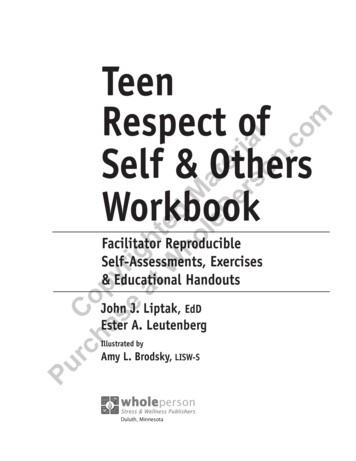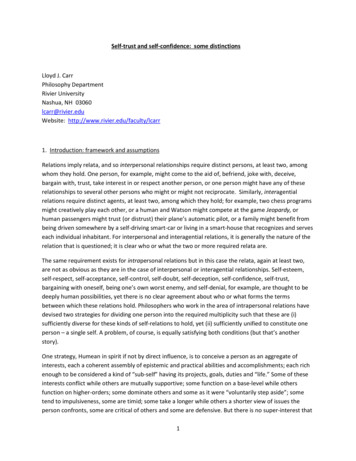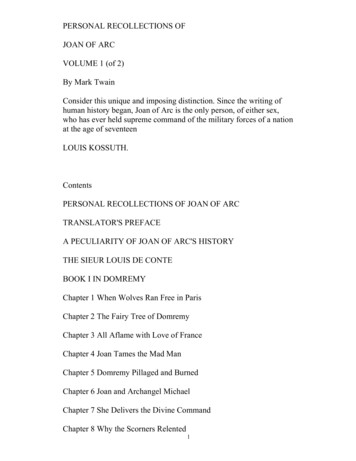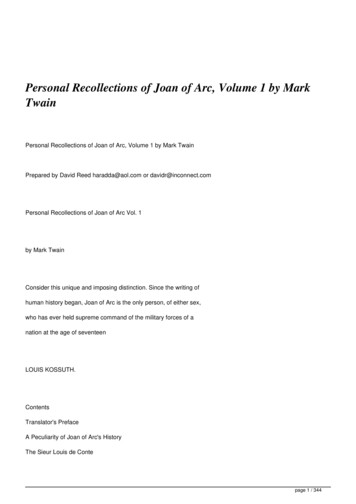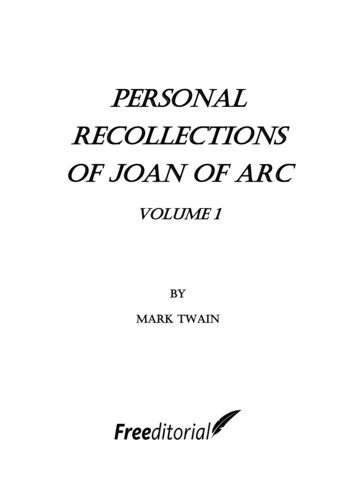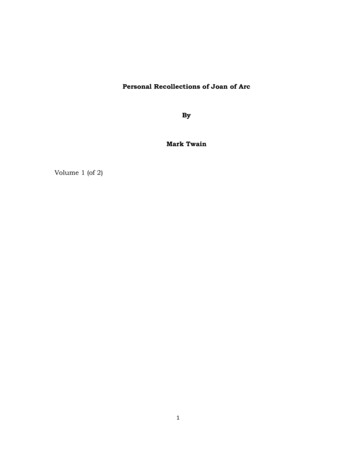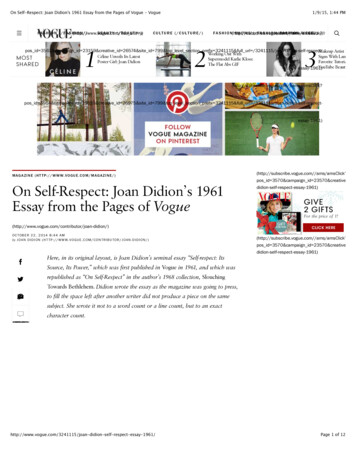
Transcription
On Self-Respect: Joan Didion’s 1961 Essay from the Pages of Vogue - VoguemF A S H I O N ( / F A S H(http://www.vogue.com/?us site y)ION/)BE AUT Y (/BE AUT Y/)1/9/15, 1:44 PMC U LT U R E ( / C U LT U R E / )1F A S H I O N(http://subscribe.vogue.com//ams/amsClick?S H O W S ( / F A S H I O NS/UFBASSC HR IIBOEN - W E GiveE K / )a gift2e3pos id 3563&campaign id 23159&creative id 26574&site id 799&top level section prefix 3241115&full url /3241115/joan-didion-self-respectMakeup Artist Lisa ElWorking Out WithCéline Unveils Its LatestSigns With Lancôme:Supermodel Karlie Kloss:Poster Girl: Joan DidionFavorite Tutorials fromThe Flat Abs GIFYouTube Beauty om//ams/amsClick?pos id 3564&campaign id 23559&creative id 26975&site id 799&top level section prefix 3241115&full url /3241115/joan-didion-self-respect-essay-1961)M AG A Z I N E ( H T T P : / / W W W. V O G U E . C O M / M AG A Z I N E / )On Self-Respect: Joan Didion’s 1961Essay from the Pages of Vogue(http://subscribe.vogue.com//ams/amsClick?pos id 3570&campaign id 23570&creative id com/contributor/joan-didion/)O C TO B E R 2 2 , 2 014 8 : 4 4 A Mby J O A N D I D I O N ( H T T P : / / W W W. V O G U E . C O M / C O N T R I B U TO R / J O A N - D I D I O N / )ftHere, in its original layout, is Joan Didion’s seminal essay “Self-respect: Its(http://subscribe.vogue.com//ams/amsClick?pos id 3570&campaign id 23570&creative id 2didion-self-respect-essay-1961)Source, Its Power,” which was first published in Vogue in 1961, and which wasrepublished as “On Self-Respect” in the author’s 1968 collection, SlouchingTowards Bethlehem. Didion wrote the essay as the magazine was going to press,uaigto fill the space left after another writer did not produce a piece on the samesubject. She wrote it not to a word count or a line count, but to an exactccharacter 241115/joan-didion-self-respect-essay-1961/Page 1 of 12
On Self-Respect: Joan Didion’s 1961 Essay from the Pages of Vogue - Vogue1/9/15, 1:44 PMAOnce, in a dry season, I wrote in large letters across two pages of a notebook thatinnocence ends when one is stripped of the delusion that one likes oneself.Although now, some years later, I marvel that a mind on the outs with itselfshould have nonetheless made painstaking record of its every tremor, I recall withembarrassing clarity the flavor of those particular ashes. It was a matter ofmisplaced self-respect.I had not been elected to Phi Beta Kappa. This failure could scarcely have beenmore predictable or less ambiguous (I simply did not have the grades), but I wasunnerved by it; I had somehow thought myself a kind of academic Raskolnikov,curiously exempt from the cause-effect relationships that hampered others.Although the situation must have had even then the approximate tragic stature ofScott Fitzgerald’s failure to become president of the Princeton Triangle Club, theday that I did not make Phi Beta Kappa nevertheless marked the end ofsomething, and innocence may well be the word for it. I lost the conviction thatlights would always turn green for me, the pleasant certainty that those ratherpassive virtues which had won me approval as a child automatically guaranteed menot only Phi Beta Kappa keys but happiness, honour, and the love of a good man(preferably a cross between Humphrey Bogart in Casablanca and one of theMurchisons in a proxy fight); lost a certain touching faith in the totem power ofgood manners, clean hair, and proven competence on the Stanford-Binet scale. Tosuch doubtful amulets had my self-respect been pinned, and I faced myself thatday with the nonplussed wonder of someone who has come across a vampire andfound no garlands of garlic at -respect-essay-1961/Page 2 of 12
On Self-Respect: Joan Didion’s 1961 Essay from the Pages of Vogue - Vogue1/9/15, 1:44 PMAlthough to be driven back upon oneself is an uneasy affair at best, rather liketrying to cross a border with borrowed credentials, it seems to me now the onecondition necessary to the beginnings of real self-respect. Most of our platitudesnotwithstanding, self-deception remains the most difficult deception. The charmsthat work on others count for nothing in that devastatingly well-lit back alleywhere one keeps assignations with oneself: no winning smiles will do here, noprettily drawn lists of good intentions. With the desperate agility of a crooked farodealer who spots Bat Masterson about to cut himself into the game, one shufflesflashily but in vain through one’s marked cards—the kindness done for the wrongreason, the apparent triumph which had involved no real effort, the seeminglyheroic act into which one had been shamed. The dismal fact is that self-respecthas nothing to do with the approval of others—who are, after all, deceived easilyenough; has nothing to do with reputation—which, as Rhett Butler told ScarlettO’Hara, is something that people with courage can do without.To do without self-respect, on the other hand, is to be an unwilling audience ofone to an interminable home movie that documents one’s failings, both real andimagined, with fresh footage spliced in for each screening. There’s the glass youbroke in anger, there’s the hurt on X’s face; watch now, this next scene, thenight Y came back from Houston, see how you muff this one. To live withoutself-respect is to lie awake some night, beyond the reach of warm milk,phenobarbital, and the sleeping hand on the coverlet, counting up the sins ofcommission and omission, the trusts betrayed, the promises subtly broken, thegifts irrevocably wasted through sloth or cowardice or carelessness. However longwe post- pone it, we eventually lie down alone in that notoriously un- comfortablebed, the one we make ourselves. Whether or not we sleep in it depends, of course,on whether or not we respect -self-respect-essay-1961/Page 3 of 12
On Self-Respect: Joan Didion’s 1961 Essay from the Pages of Vogue - VoguePhoto: Quintana Roo Dunne1/9/15, 1:44 PMATo protest that some fairly improbable people, some people who could notpossibly respect themselves, seem to sleep easily enough is to miss the pointentirely, as surely as those people miss it who think that self-respect hasnecessarily to do with not having safety pins in one’s underwear. There is acommon superstition that “self-respect” is a kind of charm against snakes,something that keeps those who have it locked in some unblighted Eden, out ofstrange beds, ambivalent conversations, and trouble in general. It does not at all. Ithas nothing to do with the face of things, but concerns instead a separate peace, aprivate reconciliation. Although the careless, suicidal Julian English inAppointment in Samarra and the careless, incurably dishonest Jordan Baker inThe Great Gatsby seem equally improbable candidates for self-respect, JordanBaker had it, Julian English did not. With that genius for accommodation moreoften seen in women than in men, Jordan took her own measure, made her ownpeace, avoided threats to that peace: “I hate careless people,” she told NickCarraway. “It takes two to make an accident.”Like Jordan Baker, people with self-respect have the courage of their mistakes.They know the price of things. If they choose to commit adultery, they do notthen go running, in an access of bad conscience, to receive absolution from thewronged parties; nor do they complain unduly of the unfairness, the -self-respect-essay-1961/Page 4 of 12
On Self-Respect: Joan Didion’s 1961 Essay from the Pages of Vogue - Vogue1/9/15, 1:44 PMembarrassment, of being named corespondent. If they choose to forego theirwork—say it is screenwriting—in favor of sitting around the Algonquin bar, they donot then wonder bitterly why the Hacketts, and not they, did Anne Frank.In brief, people with self-respect exhibit a certain toughness, a kind of moralnerve; they display what was once called character, a quality which, althoughapproved in the abstract, sometimes loses ground to other, more instantlynegotiable virtues. The measure of its slipping prestige is that one tends to thinkof it only in connection with homely children and with United States senators whohave been defeated, preferably in the primary, for re-election. Nonetheless,character—the willingness to accept responsibility for one’s own life—is the sourcefrom which self-respect springs.Self-respect is something that our grandparents, whether or not they had it, knewall about. They had instilled in them, young, a certain discipline, the sense thatone lives by doing things one does not particularly want to do, by putting fearsand doubts to one side, by weighing immediate comforts against the possibility oflarger, even intangible, comforts. It seemed to the nineteenth century admirable,but not remarkable, that Chinese Gordon put on a clean white suit and heldKhartoum against the Mahdi; it did not seem unjust that the way to free land inCalifornia involved death and difficulty and dirt. In a diary kept during the winterof 1846, an emigrating twelve-year-old named Narcissa Cornwall noted coolly:“Father was busy reading and did not notice that the house was being filled withstrange Indians until Mother spoke about it.” Even lacking any clue as to whatMother said, one can scarcely fail to be impressed by the entire incident: the fatherreading, the Indians filing in, the mother choosing the words that would notalarm, the child duly recording the event and noting further that those particularIndians were not, “fortunately for us,” hostile. Indians were simply part of thedonnée.In one guise or another, Indians always are. Again, it is a question of recognizingthat anything worth having has its price. People who respect themselves are willingto accept the risk that the Indians will be hostile, that the venture will gobankrupt, that the liaison may not turn out to be one in which every day is aholiday because you’re married to me. They are willing to invest something ofthemselves; they may not play at all, but when they do play, they know the odds.That kind of self-respect is a discipline, a habit of mind that can never be fakedbut can be developed, trained, coaxed forth. It was once suggested to me that, asan antidote to crying, I put my head in a paper bag. As it happens, there is a soundphysiological reason, something to do with oxygen, for doing exactly that, but thepsychological effect alone is incalculable: it is difficult in the extreme to continuefancying oneself Cathy in Wuthering Heights with one’s head in a Food Fair respect-essay-1961/Page 5 of 12
On Self-Respect: Joan Didion’s 1961 Essay from the Pages of Vogue - Vogue1/9/15, 1:44 PMThere is a similar case for all the small disciplines, unimportant in themselves;imagine maintaining any kind of swoon, commiserative or carnal, in a coldshower.But those small disciplines are valuable only insofar as they represent larger ones.To say that Waterloo was won on the playing fields of Eton is not to say thatNapoleon might have been saved by a crash program in cricket; to give formaldinners in the rain forest would be pointless did not the candlelight flickering onthe liana call forth deeper, stronger disciplines, values instilled long before. It is akind of ritual, helping us to remember who and what we are. In order toremember it, one must have known it.To have that sense of one’s intrinsic worth which, for better or for worse,constitutes self-respect, is potentially to have everything: the ability todiscriminate, to love and to remain indifferent. To lack it is to be locked withinoneself, paradoxically incapable of either love or indifference. If we do not respectourselves, we are on the one hand forced to despise those who have so fewresources as to consort with us, so little perception as to remain blind to our fatalweak- nesses. On the other, we are peculiarly in thrall to everyone we see,curiously determined to live out—since our self-image is untenable—their falsenotions of us. We flatter ourselves by thinking this compulsion to please others anattractive trait: a gift for imaginative empathy, evidence of our willingness to give.Of course we will play Francesca to Paolo, Brett Ashley to Jake, Helen Keller toanyone’s Annie Sullivan: no expectation is too misplaced, no role too ludicrous.At the mercy of those we can not but hold in contempt, we play rôles doomed tofailure before they are begun, each defeat generating fresh despair at the necessityof divining and meeting the next demand made upon us.It is the phenomenon sometimes called alienation from self. In its advancedstages, we no longer answer the telephone, because someone might wantsomething; that we could say no without drowning in self-reproach is an idea aliento this game. Every encounter demands too much, tears the nerves, drains the will,and the spectre of something as small as an unanswered letter arouses suchdisproportionate guilt that one’s sanity becomes an object of speculation amongone’s acquaintances. To assign unanswered letters their proper weight, to free usfrom the expectations of others, to give us back to ourselves—there lies the great,the singular power of self-respect. Without it, one eventually discovers the finalturn of the screw: one runs away to find oneself, and finds no one at .php?u ttps://twitter.com/intent/tweet?text On%20SPage 6 of 12
On Self-Respect: Joan Didion’s 1961 Essay from the Pages of Vogue - Vogue 1/9/15, 1:44 PM http://www.vogue.com/3241115/joan-didi
